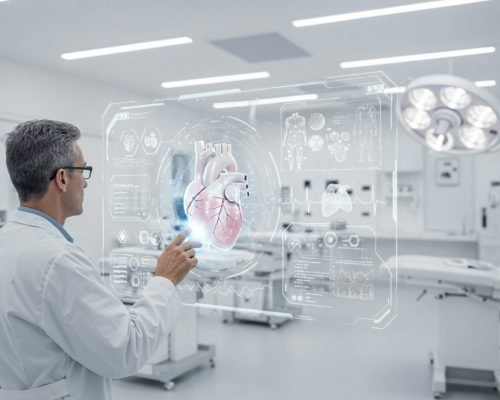In recent years, healthcare data analytics has emerged as a powerful force reshaping how patient care is delivered across the globe. With the exponential growth of medical data, healthcare providers and organizations are leveraging advanced data-driven technologies to improve outcomes, optimize operational efficiency, and enhance patient experiences.
Understanding Healthcare Data Analytics
What is Healthcare Data Analytics?
Healthcare data analytics refers to the systematic use of data analysis tools and methods to extract meaningful insights from vast amounts of healthcare information. This includes clinical data, patient records, insurance claims, medical imaging, and more.
By applying statistical analysis, machine learning, and big data technologies, healthcare professionals can identify patterns, predict risks, and make evidence-based decisions that improve patient outcomes.
The Role of Data Analytics in the Healthcare Industry
The integration of data analytics in healthcare industry practices has enabled providers to move beyond traditional approaches focused solely on treatment to a more proactive, personalized, and preventative model. From hospitals to insurance firms, analytics tools are essential for managing costs, improving care quality, and enhancing patient satisfaction.
Key Benefits of Data Analytics in Healthcare
Improving Patient Outcomes
One of the most significant benefits of data analytics in healthcare is the ability to enhance patient outcomes. By analyzing clinical data trends, healthcare providers can:
- Predict disease outbreaks and chronic condition risks
- Identify patients needing early interventions
- Tailor treatment plans based on individual patient profiles
For instance, predictive analytics in healthcare can forecast patient deterioration in intensive care units, allowing for timely intervention.
Enhancing Operational Efficiency
Healthcare facilities face increasing pressure to optimize resources and reduce costs. Data analytics healthcare solutions help streamline operations by:
- Reducing hospital readmission rates through better post-discharge care planning
- Optimizing staff scheduling based on patient flow data
- Managing inventory of medical supplies with predictive demand forecasting
Supporting Clinical Research and Innovation
Healthcare data analytics facilitates clinical trials and medical research by aggregating and analyzing vast datasets quickly. This accelerates the discovery of new treatments, improves drug development processes, and enhances evidence-based medicine.
Enabling Personalized Medicine
The concept of personalized medicine relies heavily on analyzing patient-specific genetic, lifestyle, and clinical data. Healthcare analytics tools enable the creation of tailored treatment protocols that increase the effectiveness and safety of interventions.
Technologies Driving Healthcare Data Analytics
Big Data Analytics in the Healthcare Industry
The term big data analytics in healthcare industry refers to the use of advanced computational techniques to analyze extremely large and complex healthcare datasets. These technologies handle:
- Electronic Health Records (EHRs)
- Imaging and diagnostic data
- Wearable health device information
- Social determinants of health
Big data analytics uncover hidden insights that would otherwise be impossible to detect manually.
Healthcare Analytics Software
Healthcare providers are increasingly adopting specialized healthcare analytics software platforms that integrate seamlessly with existing systems. These tools offer user-friendly dashboards, real-time data visualization, and advanced predictive modeling capabilities. They are crucial for:
- Monitoring patient populations
- Tracking treatment efficacy
- Ensuring regulatory compliance
SaaS for Medical Data Management
Cloud-based solutions like SaaS for medical data management are transforming how healthcare organizations store, access, and analyze data. These platforms provide scalable, secure, and cost-effective options to manage vast amounts of medical records while enabling collaboration across institutions.
Cloud SaaS solutions also simplify data sharing, promoting continuity of care and reducing administrative burdens.
Predictive Analytics in Healthcare
Predictive analytics uses historical data and machine learning algorithms to forecast future health events or outcomes. It is particularly valuable for:
- Identifying high-risk patients for chronic diseases
- Anticipating hospital readmissions
- Optimizing treatment schedules
Healthcare providers can shift from reactive to proactive care, potentially saving lives and lowering costs.
Real-World Applications Transforming Patient Care
Population Health Management
Healthcare organizations utilize data analytics in healthcare to monitor and improve the health of entire patient populations. By identifying trends and risk factors, providers can deploy targeted preventive programs and reduce disease incidence.
Population health analytics also assists in resource allocation and policy-making to address community health needs effectively.
Remote Patient Monitoring
With the rise of telemedicine and wearable devices, healthcare data analytics plays a critical role in data-driven healthcare solutions that enable continuous remote patient monitoring. Analytics platforms process real-time data streams to detect anomalies and alert clinicians promptly.
This approach improves chronic disease management and reduces hospital visits by providing timely interventions.
Fraud Detection and Compliance
Data analytics tools help healthcare payers and providers detect fraudulent activities and ensure regulatory compliance. By analyzing billing patterns, claim submissions, and provider behaviors, anomalies can be flagged and investigated swiftly.
This protects healthcare organizations from financial losses and maintains trust in the system.
Challenges and Considerations in Healthcare Data Analytics
Data Privacy and Security
Handling sensitive patient data requires stringent security measures. Healthcare organizations must comply with regulations such as HIPAA and GDPR, ensuring that analytics platforms safeguard privacy and prevent data breaches.
Data Quality and Integration
Effective healthcare data analytics depends on the availability of accurate, clean, and interoperable data. Challenges include fragmented data sources, inconsistent formats, and incomplete records.
Investments in data governance and integration technologies are critical to overcome these hurdles.
Skill Gaps and Adoption Barriers
Implementing advanced analytics requires skilled professionals and organizational buy-in. Many healthcare providers face shortages of data scientists familiar with medical contexts and may struggle with cultural resistance to change.
Training programs and leadership support are essential for successful adoption.
The Future of Healthcare Data Analytics
AI and Machine Learning Enhancements
Artificial intelligence (AI) and machine learning will further amplify the power of healthcare data analytics. These technologies will enable more precise diagnostics, automated workflows, and improved predictive models.
Expansion of Real-Time Analytics
As IoT devices and wearable sensors proliferate, big data analytics in healthcare industry will increasingly focus on real-time data processing, offering immediate insights to clinicians and patients.
Patient Empowerment through Data
Emerging trends also emphasize giving patients access to their own data via portals and mobile apps, fostering engagement and shared decision-making.
Elevating Patient Care Through DigitalRX.io: A Data-Driven Approach
In the evolving landscape of healthcare, DigitalRX.io stands out as a transformative platform that leverages healthcare data analytics to enhance patient care and streamline clinic operations. By integrating advanced technologies, DigitalRX.io offers a comprehensive solution for clinics aiming to adopt data-driven healthcare solutions.
Comprehensive Clinic Management with Data Analytics
DigitalRX.io’s Clinic Management Portal is designed to simplify administrative tasks while providing valuable insights through analytics. Features include:
- Appointment Scheduling: Streamlined booking system with calendar views.
- Doctor and Patient Management: Efficient handling of profiles and records.
- Real-Time Chat: Facilitates immediate communication between staff and patients.
- Analytics & Reports: Access to key metrics for informed decision-making.
These tools empower clinics to make data-backed decisions, enhancing operational efficiency and patient satisfaction.
Enhancing Patient Engagement Through Technology
DigitalRX.io offers branded mobile apps that serve as a direct channel between clinics and patients. Key features include:
- Telemedicine Integration: Secure video consultations within the app.
- Appointment Booking: Easy scheduling with reminders.
- Health Profiles: Patients can access their medical history and prescriptions.
- Pill Reminders: Notifications to ensure medication adherence.
These features not only improve patient engagement but also contribute to better health outcomes through consistent communication and access to information.
Secure and Compliant Data Management
Understanding the importance of data security, DigitalRX.io ensures compliance with HIPAA and GDPR standards. Security measures include:
- Advanced Encryption: Protects data both in transit and at rest.
- Multi-Factor Authentication: Adds an extra layer of security.
- Continuous Monitoring: Real-time threat detection and regular security audits.
These protocols safeguard sensitive patient information, fostering trust and compliance in the digital healthcare environment.
Seamless Integration and Customization
DigitalRX.io’s platform is adaptable to various specialties, offering customizable features such as:
- Website and Mobile App Customization: Tailored themes and functionalities.
- API Integration: Connectivity with existing EHR and EMR systems.
- Marketing Tools: Built-in features to promote services and engage patients.
This flexibility allows clinics to create a unique digital presence that aligns with their specific needs and goals.
Embracing the Future of Healthcare
DigitalRX.io is at the forefront of integrating predictive analytics in healthcare, enabling clinics to anticipate patient needs and optimize care delivery. By harnessing big data analytics in healthcare industry, the platform supports proactive health management and informed clinical decisions.
Ready to transform your clinic with DigitalRX.io? Explore how our platform can enhance your patient care and streamline operations by Scheduling a free consultation!
FAQs
1. How does DigitalRX.io enhance patient care through healthcare data analytics?
DigitalRX.io leverages advanced healthcare data analytics to provide clinics with real-time insights into patient health trends, appointment histories, and treatment outcomes. By analyzing this data, healthcare providers can make informed decisions, personalize treatment plans, and proactively manage patient care, leading to improved health outcomes and increased patient satisfaction.
2. What features does DigitalRX.io offer for clinic management?
DigitalRX.io’s Clinic Management Portal includes a suite of tools designed to streamline clinic operations:
- Appointment Scheduling: Efficiently manage doctor schedules and patient appointments.
- Real-Time Chat: Facilitate instant communication between staff and patients.
- Analytics & Reports: Access key metrics to monitor clinic performance.
- Doctor Wall: Share health tips and promotions to engage patients.
These features collectively enhance operational efficiency and patient engagement.
3. Is DigitalRX.io compliant with data security regulations?
Yes, DigitalRX.io prioritizes data security and is fully compliant with HIPAA and GDPR regulations. The platform employs robust security protocols, including advanced encryption and continuous monitoring, to safeguard patient data and ensure privacy.
4. Can DigitalRX.io integrate with existing healthcare systems?
Absolutely. DigitalRX.io is designed to seamlessly integrate with existing Electronic Health Record (EHR) and Electronic Medical Record (EMR) systems. This compatibility allows clinics to enhance their current setups without disrupting primary clinical workflows, providing additional functionalities like telemedicine and patient engagement tools.
5. What support does DigitalRX.io offer for telemedicine services?
DigitalRX.io provides comprehensive telemedicine solutions, including:
- Secure Video Consultations: Conduct virtual appointments with encrypted video calls.
- Integrated Patient Records: Access patient histories during consultations.
- Real-Time Communication: Utilize chat features for immediate patient interaction.
These tools enable clinics to offer remote healthcare services effectively, expanding their reach and improving patient accessibility.











